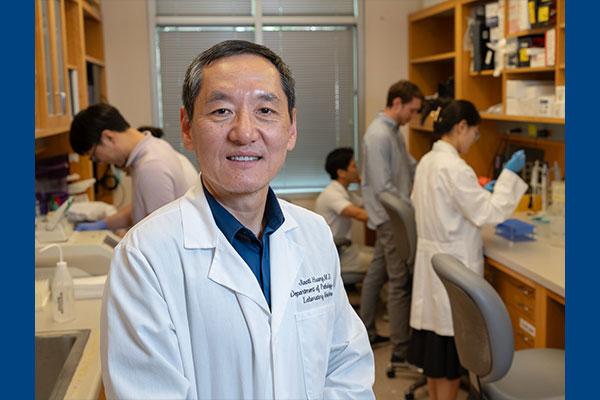
Jiaoti Huang, MD, PhD, and his colleagues at Duke University School of Medicine were recently awarded a Challenge Award by the Prostate Cancer Foundation for their work developing a therapeutic strategy to revolutionize the approach to managing patients who have few viable treatment options.
The two-year, $1 million award, titled “Targeting Neuroendocrine Cells in Prostate Cancer with Small Molecule and Targeted Radionuclide Therapies,” will fund laboratory and clinical studies targeting two novel cell surface targets, CXCR2 and GPC3, respectively, that The Huang Lab discovered in advanced therapy-resistant prostate cancer.
Currently, the most commonly used systemic therapy for advanced prostate cancer targets the androgen receptor in prostate cancer cells which is initially effective, but that inevitably leads to therapy resistance. Huang’s lab discovered a subset of tumor cells, known as neuroendocrine cells, that does not express the androgen receptor and thus contribute to therapy failure. CXCR2 and GPC3 are specifically expressed on the surface of the neuroendocrine cells and targeting these could lead to disease control while minimizing side effects.
Other Duke team members involved in the study include Andrew Armstrong, MD, director of Research for the DCI Center for Prostate and Urologic Cancers; Kent Weinhold, PhD, Joseph W. and Dorothy W. Beard Distinguished Professor of Experimental Surgery; Susan Halabi, PhD, James B Duke Distinguished Professor, Biostatistics & Bioinformatics; Michael Zalutsky, MD, Distinguished Professor of Neuro Oncology; Yutian Feng, Assistant Professor in Radiology and Fan Zhang, postdoctoral fellows in the Huang lab.
Huang is an internationally renowned prostate cancer pathologist and researcher who has spent over two decades studying strategies for targeting neuroendocrine cells to improve prostate cancer treatment. His research has been funded at a high level by the federal government and private foundations.
“The one thing I love very much is my ability to do research,” said Huang. “I can help advance the field and the results will benefit patients. Duke has a great infrastructure and a collaborative culture to perform cutting-edge research. I benefit from interacting with the many smart and caring people who work here. We have different clinical experiences and educational and research backgrounds. When we interact, novel ideas are born. For me that is very stimulating. It is very gratifying to see the needle move in a positive direction as a result.”